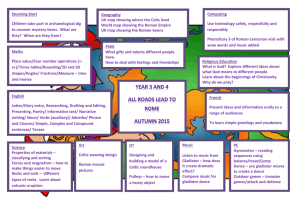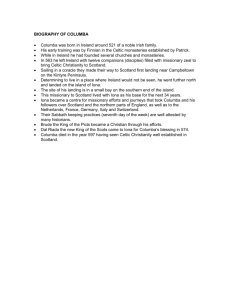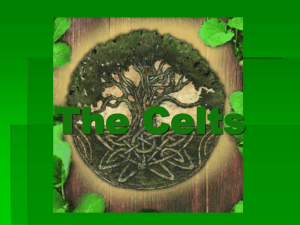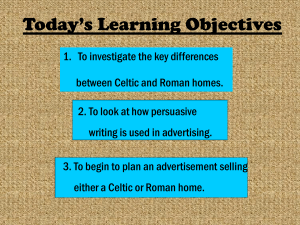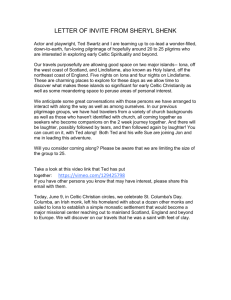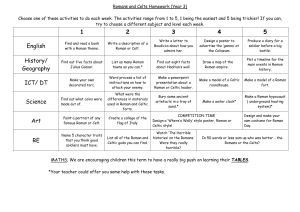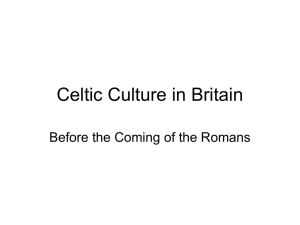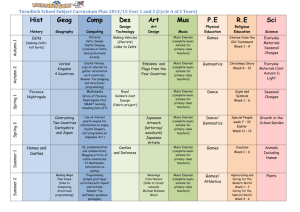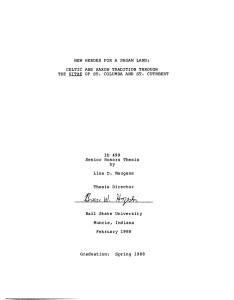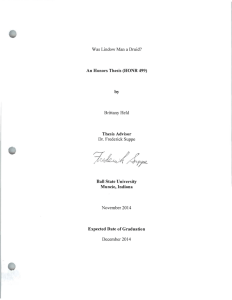The Celtic Way Church schools
advertisement
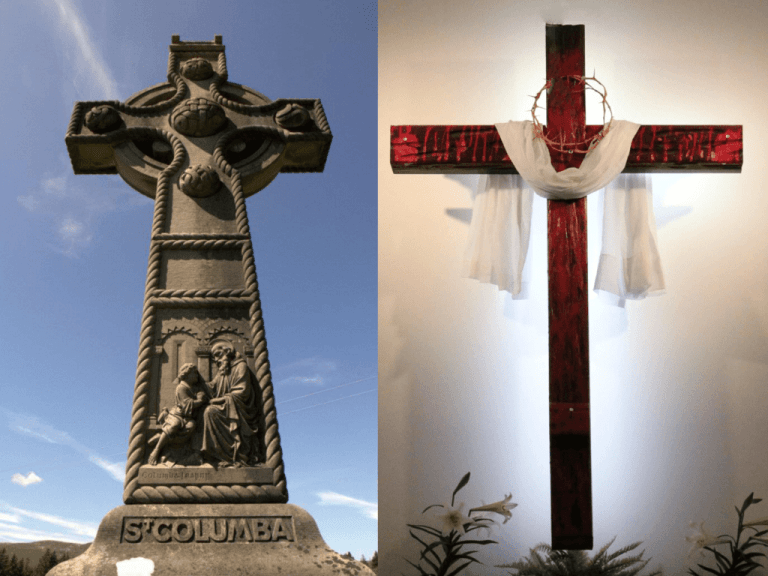
The Celtic Way: The story of two crosses NT text 30 – 90 AD Early 60’s Nero persecutions Temple Destroyed 70 AD Roman candles Domitian persecution 81-96 AD Diocletian persecution 303 Church moves east to west Jewish to a Greek movement Centre at Rome Roads, economy, persecution Christendom 312 Constantine’s revelation “Conquer by this” Christianity become legal and the official state religion Sunday Roman structure overlay the church Desert Fathers Egyptian Desert 330 Reaction to the immoral, powerful and hedonistic society Desire for pure faith In line with John the Baptist and Jesus Solitude St Antony 251-356 Spiritual disciplines; silence, prayer, fasting, obedience, manual labour, community, education “The things of God and the things of Caesar” Roman vs. Celtic Church Roman Celtic • • • • • • • • • • • • • • Force Doctrine Bureaucratic Hierarchy Sacred Buildings Creeds cities Assimilation Experience Fraternal Family / clan Sacred Nature Story telling rural The fall of Rome 500ish St Patrick 432-? First non Roman area to adopt monasticism was Ireland Ireland: the only European country not to be conquered by the Roman Empire Benedictine Renewal Movement Benedict of Nursia 480-543 Benedictine rule 500 Prayer, work, education, health care Community, social welfare First universities, trade schools agricultural development, wine industry Economic units The Celts A diverse group of tribal societies in Iron age Europe Celts: hidden Roman roads and domination Spread to Ireland, Wales, Cornwell, Scotland, Isle of Man & Brittany (six Celtic states) Druids Highly organised inter tribal fraternal. Mystery because no written material on Druids Druid study 3x7 Law Religion - magic, diviners, seers History Medicine Science Art Astronomy Geography Natural philosophy Believed to immortality therefore no fear of death The reason they were so fierce in battle was that they had no concept of death, rather it was a passing from one world to the next world. The soul does not die at death but passes from one body into another. No one could be a Druid and a Roman citizen 41- 54 AD Banning all religious practices of Druid St Columba St Columba: Born 7th December 521 Gartan, Co Donegal Prince of the Ui Neill kingship Destined to be a King? Kingship: loose federation of tribal kingships in both Ireland and Scotland St Columba referred to Christ as his Druid And he was a Druid for Christ Baptised as Crimthann (fox), later nick name Colmcille - dove of the church because of his childhood passion and interest in the church 563 St Columba leaves Ireland a) Guilt and penitence b) Mission c) Pilgrimage d) Political expansion The king maker 574 St Columba gifted Iona by Conall king of Dal Riata (Argyll) Early work of St Columba was not as a missionary but as a diplomat, securing peace and forming political alliances. Vision from God to appoint Aidan as king Pilgrim Peregini Genesis 12:1 “leave your own country, your kin, and your fathers house” The way of Christ Sometimes you have to leave home to find Christ Martyrdom the gift you only use once (unless you are Irish) Red - death White – pilgrimage /mission Green – wilderness / nature D Pioneer of monastic communities Communities of Hospitality, service, work, worship, artistic expression and education Anam Cara Soul friend / spiritual director Creativity You may be thinking, “This is fine for artists, who are a small and elite group of people, far distant from my own hard-working, bill-paying, laundry-washing world.” But the ancient Celts affirmed that we are all artists of one sort or another. The Celtic way is to knot things together : the sacred and secular, art and ordinary life. If we heed the distant call from the Celts’ ancient world, we will begin to re-tie the sacred knot in our lives. God made you in God’s image; God is the Creator; and so you too are a creator of one sort or another . Whatever talents you have— and you have many potential talents you have forgotten or not yet developed— reflect the Maker who dwells inside you. Your imagination may be asleep, but it is ready to wake up. “The world will pass away, but love and music last forever.” —Gaelic proverb The Celtic Cross More that you’d expect The conversion of Druid “Standing Stones” by St Patrick The circle a) Pagan symbol for the sun b) To make the stone cross stronger c) Symbol for life The cross was not seen as a symbol of the Atonement “Christ saving death on the cross” but as a declaration of Christ as Lord over all of creation. To tell a significant story Art as a teacher Used as a tool for prayer and discernment A direction finder Sin; a broken relationship with God’s creation Western Christianity has tended to view sin as a moral action. The Celtic way would see sin as being “out of sorts” with God and God’s creation. Salvation then is the healing of a broken relationship. Sin Instead, sin is, in essence, forgetting the Great Song, forgetting the beauty of life, forgetting the holy thread running through our own lives, thereby forgetting the divine wisdom within the Creation and all the orders of Creation. Sin is what makes it possible for humans to destroy one another and the planet. Sin is what makes it possible for industrial plants to dump gallons of toxins into the water supply. St Ninian “What is the fruit of study?” The answer is: “To perceive the eternal Word of God reflected in every plant and insect, every bird and animal, every man and woman”. A way of seeing: a soft gaze When walking out on the land, it is good to invite the “eyes of the seer” and the “eyes of the poet” to be present. These are eyes that see the true shape of things. Poets and seers see things differently. GO GENTLY Go gently as you climb Máméan of Connamora. Walk in a manner appropriate for the mountain and for the greater good. Take two hands, one for the mountain and one for yourself. Tread softly upon the ground. With each step your foot will be received by creation's waiting. This ground will love you and wound you deeply. There is no safe pass on this pilgrimage but, do not be afraid "I am" is with you. Looking straight into the wind allow the tears to flow across your face as you remember where you have come from and the people who have gifted you with legacy. When you stumble at the station of the cross take the third hand, the hand of grace that lifts you back to your feet again. Take off your shoes and stand still, this is holy ground and listening for the still small voice that calls your name turn sideways into the wind, surrender, and as you return to a world in waiting go gently . . . Andrew Norton, July 2013
